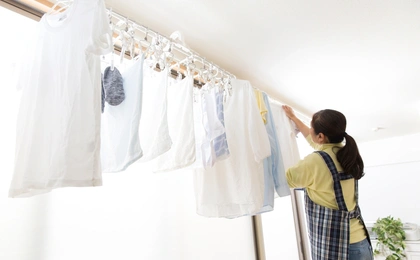Although it’s quick and convenient to dry clothes on the radiator, it isn’t the cheapest option. And with energy bills going through the roof, many of us are looking for ways to save money on heating this winter.
So, we’ve researched alternative ways to dry your clothes indoors when the weather is cold and wet – without turning on the central heating.
Use a tumble dryer
Tumble dryers can be expensive to buy – from around £200 up to about £700, depending on the make and model you go for. But if you’ve already got one, you only need to consider running costs, which tend to be less for heat pump tumble dryers than other varieties.
They come in handy if you have a lot of washing to get through. You’re looking at around £68 a year to dry three large loads of washing a week with a heat pump dryer. Whereas non-heat pump dryers could set you back around £250 a year, and condensers around £170 a year, according to Which?
Give your clothes an extra spin
If you don’t have a tumble dryer, you could put your washing machine on an extra cycle for a few minutes to remove excess water from your clothes. The faster the spin, the more water it should drain, and the quicker your clothes will dry. This will cost a little extra in electricity though, so you might want to save this for thicker items.
Another handy tip is to not overfill your washing machine, as this can lead to your clothes retaining more water.
Hang up your clothes on the curtain rod
Ideally, you’d be able to hang your clothes outside, but in winter that isn’t always a realistic option. Instead, you could do the next best thing – hang them up on a curtain rail with the window slightly open. This might mean they take less time to iron too!
Make the most of your clothes airer
Another cheap option is to use a traditional clothes airer. The trick is to space your clothes out, so they dry evenly. Instead of placing them by a radiator, you could put them next to a warm oven after cooking to make use of the excess heat (just don’t put them too close!). Or you could put them in a spare room with the window open for ventilation.
Upgrade to a heated clothes airer
If you feel that regular clothes airers take too long, you could look into getting a heated electric version. They can range from about £40 to over £200, which is less than most tumble dryers.
There are running costs to factor in though. Which? state that it costs about £163 a year to dry three large loads of washing a week with a heated clothes airer.
Tip: Put a sheet over the top of them to keep the heat in and dry your clothes faster.
Invest in a dehumidifier
Some dehumidifiers come with a laundry setting to help your clothes dry off. They range from around £50 to over £150, which isn’t cheap, but is less than the cost of a tumble dryer.
Running costs vary depending on things like the make, model and maximum wattage. Ideal Home estimate that an hour’s usage could cost around 5p to 16p (based on the October 2022 energy price cap). This is similar to heated airers which cost around 9p an hour on average, according to Which?
The added benefit of dehumidifiers is that they can reduce condensation generated by damp clothes – without the need to open windows.
Consider getting a drying pod
Drying pods are a bit like small tents with a clothes rack inside. They come with built-in fans that blow hot air to dry your clothes.
These devices cost around £100 to buy, which is similar to a heated airer, and less expensive than a tumble dryer. But pods can dry clothes a lot quicker than heated airers. The downside is that they cost about four times more in electricity.
What tricks could I use for smaller items of clothing?
For things like socks and underwear, you could try drying them off using the heat from an iron. To protect your clothes, put a towel over them beforehand. Or you could use a hair dryer. Remember not to put the clothes too close to the nozzle, to prevent your hair dryer from overheating.
Read on for 3 ways to save £375 by switching to a smart home.
Adele is a personal finance writer with more than 10 years in the finance industry behind her. She writes clear and engaging guides on all things loans for Ocean, as well as contributing blogs to help people understand their options when it comes to money.










